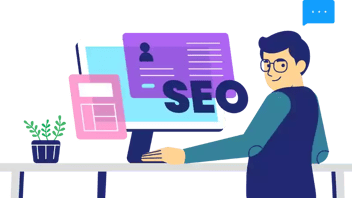Los proveedores de software tienen el potencial de ofrecer mucho valor a sus consumidores. Ya sea optimizando los procesos de contratación, implementando inteligencia artificial o creando una útil herramienta de gestión de las relaciones con los clientes, el software llena vacíos para crear eficiencia y hacer que la carga de trabajo diaria sea mucho más productiva para los clientes. Aunque los proveedores de software conocen las ventajas de sus productos, también deben mostrar a los consumidores potenciales lo que se están perdiendo. Involucrando, educando y desarrollando confianza con los consumidores potenciales, fomentamos relaciones duraderas, aumentando nuestro éxito y consiguiendo clientes encantados. 
Cuando HubSpot acuñó las tres sencillas etapas del inbound marketing, "atraer, comprometer y deleitar", básicamente descifraron el nuevo código de hacer negocios. El inbound deja de lado las técnicas de marketing tradicionales. En su lugar, ofrece una estrategia atractiva e informativa para el consumidor, desde el principio del ciclo de ventas hasta el final. Para quienes no están familiarizados con esta estrategia, puede parecer desalentadora y, francamente, abrumadora. Además, algunas empresas no creen que sea adecuada para ellas, pero lo cierto es que el inbound marketing puede aplicarse a cualquier negocio, incluso a los que son extremadamente de nicho. Conocer y comprender los conceptos básicos del inbound mostrará lo importantes que son las estrategias para el éxito y la competitividad en el mercado actual. Hacer hincapié en el compromiso y el contenido es lo que impulsará ese éxito.

Contenido diseñado para atraer
La creación de contenidos excepcionales sobre su empresa y su sector objetivo, orientados específicamente a sus buyer personas, puede ayudarle a atraer a los consumidores potenciales adecuados. Puede (y debe) difundir contenidos a través de múltiples plataformas, no sólo en su sitio web. El uso de plataformas de redes sociales como Facebook o Instagram ayuda a que su empresa sea vista y aumenta sus oportunidades de participación. Dicho esto, la publicación regular de entradas de blog en su sitio web que cubren diversos temas que atraen a su público objetivo puede ayudar a crear un compromiso significativo.
Puede que te preguntes qué tipo de contenido deberías crear. Una vez más, piense en quién es su consumidor "típico": ¿qué tipo de preguntas hace? ¿Qué buscan en Google? ¿Qué tipo de problemas pueden tener? Ser capaz de responder a estas preguntas y crear contenido relevante en torno a ellas mostrará un profundo conocimiento de tu consumidor y mejorará enormemente tus esfuerzos de inbound.
...¡y educar!
Ser un recurso de confianza debería ser uno de tus principales objetivos en cuanto a la creación de contenidos. Cuando la gente acude a un motor de búsqueda para resolver un problema o responder a una pregunta, no busca que le vendan nada. Por eso su contenido debe ser una oportunidad educativa.
Piense en este escenario. Eres un profesional de recursos humanos que dirige un equipo en tu empresa. Sabes que estarás fuera de la oficina durante unas semanas, pero quieres asegurarte de que tus esfuerzos publicitarios de contratación no se resientan por tu ausencia. Tras una rápida búsqueda en Google, este blog explica la "automatización del marketing de contratación". Te ofrece nuevas perspectivas sobre la contratación en las que no habías pensado antes o que ni siquiera sabías que existían. Al instante te sientes aliviado al encontrar respuestas. La próxima vez que tenga un problema, es probable que recurra a este recurso en busca de una solución.
La credibilidad de la marca es un obstáculo importante para las empresas modernas, y este tipo de contenido es una forma importante de reforzar esa credibilidad. Usted quiere ser una empresa en la que la gente pueda confiar para obtener información honesta.
Cultivar las relaciones
La combinación de tener una persona objetivo y el tipo adecuado de contenido ayudará a su empresa a atraer y captar clientes potenciales. Aun así, también es importante saber su "por qué". Los profesionales del marketing entrante se enorgullecen de crear relaciones significativas con los consumidores potenciales y de demostrar que usted y su empresa son un recurso creíble y digno de confianza. Debes ser visto mucho más como un asesor que como un "vendedor". La filosofía probada y verdadera de escuchar el 90% del tiempo y hablar el 10% del tiempo va en consonancia con el inbound. Como asesor publicitario de confianza, tu trabajo consiste en conocer al consumidor en el punto del proceso en el que se encuentra y ofrecerle respuestas a medida que encuentra lo que busca.
"SCOPE" es como HubSpot denomina a sus principios de inbound: estandarizar para lograr coherencia, contextualizar para lograr relevancia, optimizar para lograr claridad, personalizar para lograr impacto y empatizar para lograr perspectiva. Estos cinco principios deben ser prioritarios a la hora de crear una estrategia de captación sólida, ya que mantienen al cliente potencial en el punto de mira durante todo el proceso. Cada persona es única y debe ser tratada como tal. Demuestra que te importa de verdad ofreciendo una experiencia personalizada relevante para la persona. Confiarán en tus consejos y, con suerte, invertirán en tus ofertas.
Si usted es un proveedor de software o cualquier otra empresa, cree en su producto y conoce las ventajas que puede ofrecer a un cliente potencial. Pero la forma de transmitir ese mensaje es crucial para el éxito de su negocio. Al crear una experiencia excepcional durante todo el ciclo de ventas, puede estar seguro de dejar un impacto duradero y positivo en sus clientes actuales y futuros. Como resultado, estos mismos consumidores volverán a usted para su próxima solución y le recomendarán a un amigo o conocido. Con un contenido verdaderamente educativo, usted sienta las bases de este crucial sentimiento de confianza entre su empresa y el consumidor. Como dijo Simon Sinek: "La gente no compra lo que haces; compra por qué lo haces".










Deja un comentario